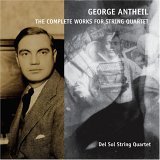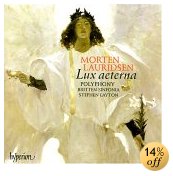| Record companies, artists and publicists are invited to submit CDs to be considered for review. Send to: Jerry Bowles, Editor, Sequenza 21, 340 W. 57th Street, 12B, New York, NY 10019 |
Latest Posts
Ernst Pepping and Allan Pettersson: Moral Dilemmas in Symphonic Music
"The numbers all go to eleven. Look, right across the board, eleven, eleven, eleven and... "
Tell the Birds
Soundtrack to an Apocalypse
Feast Your Ears: New Music for Piano
Gone For Foreign
Fred Lerdahl: Time After Time
Nothing Sacred
Two From Wayne Horvitz
Two Fresh Cantaloupes
Record companies, artists and publicists are invited to submit CDs to be considered for our Editor's Pick's of the month. Send to: Jerry Bowles, Editor, Sequenza 21, 340 W. 57th Street, 12B, New York, NY 10019



|
Archives
Saturday, December 18, 2004
Saturday, December 25, 2004
Friday, December 31, 2004
Wednesday, January 05, 2005
Monday, January 10, 2005
Thursday, January 13, 2005
Thursday, January 20, 2005
Sunday, January 23, 2005
Monday, January 24, 2005
Saturday, January 29, 2005
Wednesday, February 02, 2005
Thursday, February 03, 2005
Monday, February 07, 2005
Tuesday, February 08, 2005
Friday, February 11, 2005
Monday, February 14, 2005
Wednesday, February 16, 2005
Tuesday, February 22, 2005
Monday, February 28, 2005
Sunday, March 06, 2005
Monday, March 07, 2005
Wednesday, March 09, 2005
Sunday, March 13, 2005
Friday, March 18, 2005
Monday, March 28, 2005
Saturday, April 02, 2005
Monday, April 11, 2005
Sunday, April 17, 2005
Tuesday, April 19, 2005
Monday, April 25, 2005
Monday, May 02, 2005
Monday, May 09, 2005
Tuesday, May 17, 2005
Tuesday, May 31, 2005
Monday, June 06, 2005
Thursday, June 16, 2005
Sunday, June 19, 2005
Sunday, July 10, 2005
Wednesday, July 13, 2005
Sunday, July 24, 2005
Friday, July 29, 2005
Monday, August 08, 2005
Monday, August 22, 2005
Wednesday, August 24, 2005
Friday, September 16, 2005
Sunday, September 25, 2005
Tuesday, October 04, 2005
Tuesday, October 18, 2005
Monday, October 24, 2005
Tuesday, November 01, 2005
Monday, November 07, 2005
Saturday, November 12, 2005
Wednesday, November 16, 2005
Tuesday, November 29, 2005
Friday, December 16, 2005
Monday, January 09, 2006
Thursday, January 12, 2006
Thursday, January 19, 2006
Tuesday, January 24, 2006
Thursday, February 02, 2006
Monday, February 13, 2006
Wednesday, February 15, 2006
Wednesday, March 01, 2006
Sunday, March 19, 2006
Sunday, March 26, 2006
Friday, March 31, 2006
Sunday, April 09, 2006
Monday, April 10, 2006
Thursday, April 20, 2006
Friday, April 21, 2006
Thursday, May 11, 2006
Thursday, May 18, 2006
Saturday, May 20, 2006
Friday, June 02, 2006
Tuesday, June 06, 2006
Friday, June 16, 2006
Monday, June 19, 2006
Sunday, June 25, 2006
Monday, June 26, 2006
Monday, July 10, 2006
Thursday, July 13, 2006
Thursday, July 20, 2006
Friday, July 21, 2006
Sunday, July 23, 2006
Thursday, August 03, 2006
Wednesday, August 09, 2006

|
|
Tuesday, May 17, 2005
Antheil, Lauridsen, Martinu et al
 Music for String Quartet Music for String Quartet
George Antheil
Del Sol String Quartet
Other Minds
What is one to make of a composer who shocked the music world in 1924 with an avant garde piece called Ballet mécanique orchestrated for a percussion orchestra of three xylophones, four bass drums, and a tam-tam, two "live" pianists; seven electric bells, a siren, three airplane propellors and 16 synchronized player pianos and then--24 years later—wrote a third string quartet that sounds like it was discovered at the bottom of Dvorak’s American trunk? George Antheil was talented, for sure, but whether that talent was for writing music or for self-promotion has always been an open question.
This disk, produced by longtime Antheil champion Charles Amirkhanian and played with considerable passion by the Del Sol String Quartet, makes a generally persuasive case that Antheil could have been a contender. Perhaps, Antheil should have spent more time writing “serious” music and less time hacking out Hollywood scores and inventing torpedoes with Hedy Lamarr—not that the latter activity does not sound like fun.
Perhaps, he was what is called in horse racing terms “cheap speed,” a horse that runs great for the first half-mile and then fades. In any event, this is an entertaining disk. The first two string quartets are excellent and there is an extraordinary short piece called Lithuanian Night from the composer’s days afield in 1920s Paris that suggests what young Antheil might have become.
 Lux aeterna Lux aeterna
Morten Lauridsen
Stephen Layton
Polyphony, Britten Sinfonia
Hyperion
Morton Lauridsen is the American Arvo Part. Or maybe the thinking man’s John Rutter. Neither characterization is meant to disparage his relatively small body of accessible and hugely popular choral works but simply to acknowledge that he has achieved that rarest form of acclaim—both critical and commercial success. Lauridsen is among a select group of composers who write new music that sounds old and causes CD buyers to reach instinctively for their Visa cards.
Lux Aeterna, premiered in 1997, has become perhaps the most frequently performed modern American choral work. Composed for and dedicated to the Los Angeles Master Chorale (which recorded it first in 1998 and received a Grammy Award for its effort), the work is in five movements played without pause. Its texts are drawn from sacred Latin sources, each containing references to light. Although it sounds religious and opens and closes with the beginning and ending of the Requiem Mass, with the three central movements drawn, respectively, from the Te Deum (including a line from the Beatus Vir), O Nata Lux and Veni, Sancte Spiritus, it is not religious music. Lauridsen goes to some length in his notes to describe the work as non-liturgical although it is sometimes performed by church choirs.
The new Hyperion release contains other Lauridsen pieces--Madrigali, Ave Maria, Ubi Caritas Et Amor, and O Magnum Mysterium. The high point of the disk is Madrigali, a choral ode for a capella chorus composed in 1987 that uses techniques borrowed from Monteverdi and Gesualdo. This is dark territory; in fact, just about the mirror opposite of Lux Aeterna.
The singing group, Polyphony, conductor Stephen Layton and the Britten Sinfonia recorded this CD in 2003, with the composer present, at the Temple Church in London. The acoustics are superb. Polyphony is (or are, if you happen to be English) a much smaller group than the Los Angeles Master Chorale (where, Lauridsen is composer in residence) and that makes the sound clearer and more intimate than the LAMC recording but also lacking in some of the sheer power. It’s a toss up. Get them both.
 Twentieth Century Oboe Concertos Twentieth Century Oboe Concertos
Bohuslav Martinu, Pawel Sydor, Marco A. Yano
Alex Klein, oboe
Paul Freeman, Czech National Symphony Orchestra
Cedille
When we were having a little discussion about the most underrated 20th century composers over on the front page, I somehow forgot to mention Bohuslav Martinu, who wrote so much music that many people assume that his prodigious output must be uneven but, in fact, maintained an impossibly high standard across the full spectrum of musical genres. I have never heard a piece by Martinu that I would give less than 9 on a scale of 10. Oboist Alex Klein opens this superb, bargain-priced 2-CD set with Martinu’s 1955 Concerto for Oboe and small Orchestra and you recognize immediately that you are in the world of genuis—a flat-out masterpiece by Martinu and a great player in Alex Klein.
The rest of CD 1 and CD 2 are world premiere recordings of two works written expressly for Klein. Fellow Brazilian native Marco Aurélio Yano's bright and exotic Oboe Concerto (1991) has a sad tale attached. Yano finished the manuscript for all three movements in 1991, and began working on the orchestration for the second movement but was stricken by brain cancer that took his life at 27. The orchestration was completed by his composition teacher, Edmundo Villani Cortes, and Klein himself. This is a major work, nearly 38 minutes in length, that draws from Brazilian influences, stretches the limits of the instrument and underlines Yano’s early death as an important musical loss.
Polish composer Pawel Sydor's dramatic Virtuti Militari (1992), a musical fable of individual heroism under social repression, explores the whole range of the oboe's technical and musical possibilities. The Czech National Symphony plays superbly; especially the Martinu.
posted by Jerry Bowles
12:05 AM
|
|




